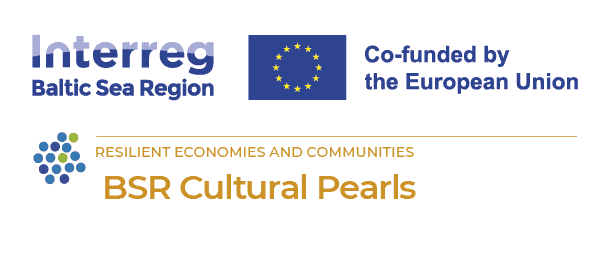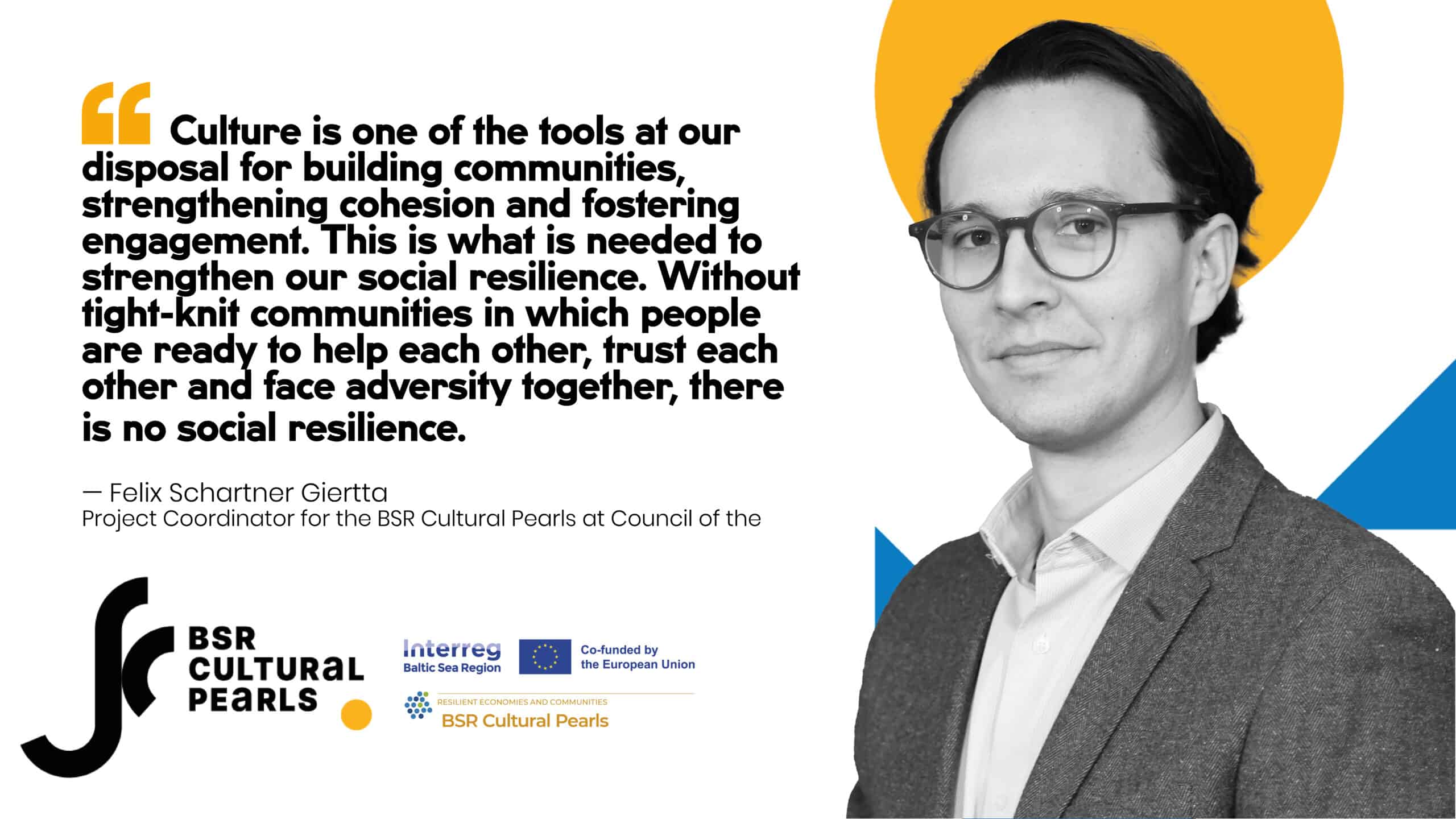
Fostering Social Resilience in the Baltic Sea Region. An Inspiring Conversation with Felix Schartner Giertta on the BSR Cultural Pearls Project
05 July 2024
In July 2024, the Communication Team of the Council of the Baltic Sea States (CBSS) met with Felix Schartner Giertta to discuss challenges, achievements, and major milestones of the BSR Cultural Pearls project. The result of the discussion is available as an interview below.

CBSS: Felix, could you provide some context on the BSR Cultural Pearls project and its significance?
Felix Schartner Giertta: Absolutely. The BSR Cultural Pearls project was conceived during a time of significant upheaval. Just as we believed the COVID-19 pandemic was behind us, we woke up to a war at our doorstep, which has triggered a myriad of crises—humanitarian, political, energy, economic, and refugee-related. Additionally, we should not forget the climate and biodiversity crises that particularly impact the Baltic Sea Region. As a society, we need to be able to absorb, bounce back, or even bounce forward from these crises. This means having the capacity to adapt and develop with new realities, without losing our essential traits, levels of wellbeing or identities on the way. This is where the BSR Cultural Pearls project comes into play, harnessing the huge potential of culture and creativity to drive social resilience and strengthen our communities, enabling them to cope with adversity. This is especially true for smaller municipalities, which often feel left out and may not be aware of, or underutilise, the potential that lies within their communities as well as unlocking collaboration and exchange of experiences between these places in our region.
CBSS: What are some of the barriers the project aims to overcome?
FSG: One of the primary challenges is the common perception of culture. When we hear “culture”, we might think about fun and entertainment or maybe fine arts, music and dance or even heritage and identity. But we rarely associate it with resilience or security. What’s more, city officials and other authorities often view culture as “nice to have” rather than as a hard necessity, like roads, schools, or other infrastructure. However, culture is one of the tools at our disposal for building communities, strengthening cohesion and fostering engagement. This is what is needed to strengthen our social resilience. Without tight-knit communities in which people are ready to help each other, trust each other and can face adversity together, there is no social resilience. Another issue is that many smaller municipalities might think, “Oh no, this is not for us; we are too small.” Yet, setting up plans to increase social resilience by tapping into the transformative power of culture is within reach of all municipalities, no matter their size.
CBSS: How does the BSR Cultural Pearls project address these barriers?
FSG: With the BSR Cultural Pearls project, we set out to show that cities can and should create conditions for their communities to grow strong and resilient. In addition, we show that culture can indeed be an instrument for building communities and boosting social resilience – and not just in bigger municipalities. At the core of the project are the so-called Culture and Resilience Plans, or CuReAP. These are plans developed by municipalities to increase their social resilience. The BSR Cultural Pearls project covers all aspects of creating these plans. This includes a collection of exemplary practices for social resilience, tailored tools and templates to assist municipalities in developing their own culture-focused social resilience plans, and a peer-learning and mentoring programme to support municipalities during the plan implementation. The cherry on top is the “BSR Cultural Pearls Title”, which honours exceptional culture-driven social resilience plans by municipalities, brings visibility and creates momentum for change.
CBSS: How did you ensure the project effectively eliminated these barriers?
FSG: Everybody loves a competition! This is why we set up the “BSR Cultural Pearls Title”, which is awarded every year to four local or regional authorities in the Baltic Sea Region. We specifically encouraged, and still encourage, smaller municipalities to apply. Our two-stage selection process also ensures that towns and cities with the right motivation receive all the support and knowledge needed to create a robust plan together with us. This means that a good portion of the capacity-building is shared with all candidates, even before some of them receive the title. The international dimension of the title triggered the interest of many municipalities of all sizes. In a sense, the title is the lighthouse of the project. We also showed that the road to a culture-driven social resilience plan is not a complicated one full of obstacles; it is easy to set up such a plan. The extremely varied and colourful consortium of project partners was very helpful too: municipalities, regional authorities and governments, cultural organisations, planning authorities, and pan-Baltic organisations. This very eclectic mix helped us tick all the boxes and get the project right. In general terms, it is already clear that the project has brought some attention to the topic of culture-driven social resilience in the Baltic Sea Region. Culture-driven social resilience is becoming a thing in the BSR.
CBSS: Can you share some examples of municipalities using this solution?
FSG: Of course. In December 2023, we already awarded the very first “BSR Cultural Pearls Title” for the year 2024 to four municipalities out of twelve eligible candidates. The municipalities of Svendborg in Denmark, Kiel in Germany, Jakobstad in Finland, and Rūjiena in Latvia were chosen from twelve candidates from around the Baltic Sea Region. They have now enrolled in a year-long “Cultural Pearls” programme, which includes mentorship to support the implementation of their action plans, capacity-building with expert interventions and networking, international exchange, and a ready-made model for procuring service providers from the local culture and creative sector (CCS), covered by the project. Each municipality has unique visions for their Culture and Resilience Plans.
The vision for the BSR Cultural Pearls title year in Jakobstad, Finland is to transform the Old Fire Station, a historic red brick building from 1913, into a vibrant third-place environment where citizens can gather, associations can thrive, and the community can connect near home or work.
One of the main priorities of Kiel, Germany in its Culture and Resilience action plan is to empower children and young people through cultural learning, as this is deemed crucial for building sustainable social resilience, by engaging these groups in city activities, promoting equal opportunities and societal participation, and tackling the social divide by including marginalised groups and people with disabilities to foster a sense of belonging and local identity.
Svendborg in Denmark aims to address the economic and social threats posed by an ageing population and increasing youth discontent by investing in the resilience of children and youth, fostering their participation in social communities, and promoting co-creation to empower them, thus building a resourceful, empowered, and socially resilient young population capable of shaping and sustaining the community’s future.
Rūjiena, the northernmost town in Latvia, aims to foster an open, democratic, and civically active society through its Culture and Resilience Action Plan by promoting community engagement, building intergenerational dialogue, and strengthening a sense of belonging to reverse population decline and sustain interest in rural living, leveraging its status as a “seniors’ town” to enable knowledge transfer between generations and deepen cross-border cooperation with Estonia.
We’ve also just completed the first stage of the second call for applications, resulting in eighteen applications – which proves that more and more cities deem this to be an interesting and relevant approach for them.
CBSS: How has Interreg contributed to the project’s vision and success?
FSG: Interreg, as a key facilitator and funder of regional cooperation, has played a crucial role in the BSR Cultural Pearls project by providing financial support and guidance. This backing has enabled the implementation of the BSR Cultural Pearls project, a cross-border initiative, that might not have been feasible otherwise. Interreg has also enabled putting together a project consortium from all over the Baltic Sea Region, which was key for the success, and pan-Baltic acceptance, of the project.
CBSS: Felix, thank you for sharing the inspiring journey of the BSR Cultural Pearls project. It’s clear that culture can indeed be a powerful tool for building resilient communities.
FSG: Thank you. It’s been a pleasure discussing this project, and I hope it inspires more municipalities to see the value of culture in fostering social resilience.
 Felix Schartner Giertta is the project coordinator at the Council of Baltic Sea States Secretariat in Stockholm. He leads the Interreg Baltic Sea Region project BSR Cultural Pearls, which supports local authorities in fostering stronger communities and social resilience through culture. He has extensive experience in leading transnational projects across the Nordics and the Baltic Sea Region, spanning various programmes. He has a keen interest in cross-sector approaches and participatory methods. Felix holds a BA in European Studies from University College London and Sciences Po in Paris, and an MSc in Political Studies from Uppsala University.
Felix Schartner Giertta is the project coordinator at the Council of Baltic Sea States Secretariat in Stockholm. He leads the Interreg Baltic Sea Region project BSR Cultural Pearls, which supports local authorities in fostering stronger communities and social resilience through culture. He has extensive experience in leading transnational projects across the Nordics and the Baltic Sea Region, spanning various programmes. He has a keen interest in cross-sector approaches and participatory methods. Felix holds a BA in European Studies from University College London and Sciences Po in Paris, and an MSc in Political Studies from Uppsala University.





